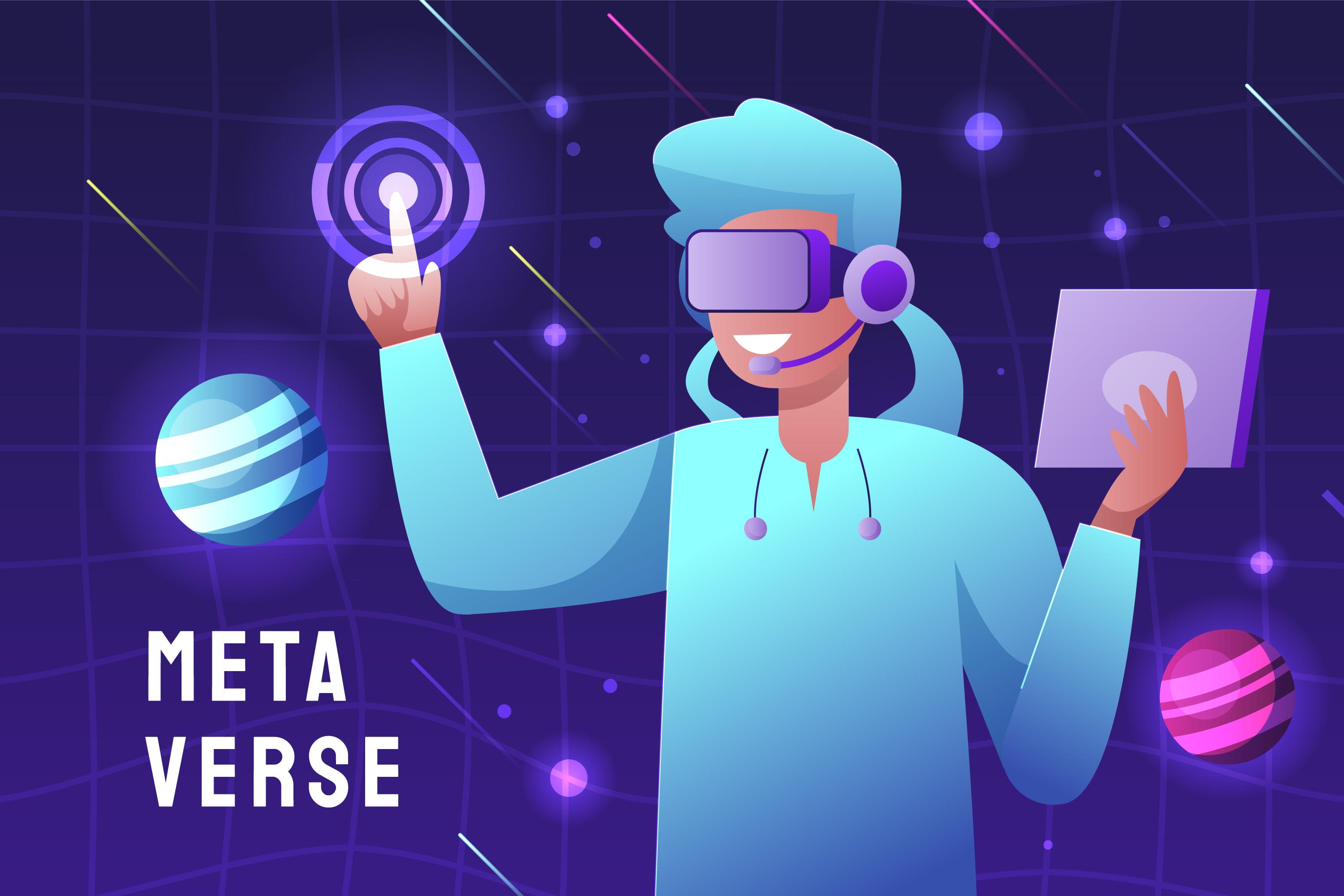Imagine a virtual environment where you can go through your everyday routine from your comfort home. You may meet friends, make purchases, and have everything delivered to your home or consumed digitally. You can go to a virtual cinema and watch movies together. We call it Metaverse.
A thorough examination of the metaverse can help determine whether the metaverse notion will be sustainable in the long term. For establishing an unbiased image of the metaverse, this article provides an overview of the metaverse and its emerging use cases, including its benefits and challenges.
What is a Metaverse?
A metaverse is a virtual world combining social networking, online gaming, augmented reality (AR), virtual reality (VR), and cryptocurrency that allows people to connect digitally. To improve the user experience, augmented reality overlays visual components, sound, and other sensory input onto real-life scenarios.
The term Metaverse originated from Neal Stephenson’s futuristic cyberpunk novel ‘Snow Crash.’ According to the novelist Neal Stephenson, the metaverse is a virtual world in which humans can interact with each other and digital solutions through their avatars. Surprisingly, Neal Stephenson’s concept for the metaverse depicted it as the internet’s future evolution on the shoulders of VR technology.
Many individuals and organizations today are eager to take advantage of the benefits offered by the metaverse. According to Gartner, by 2026, 25% of individuals will spend at least one hour every day in the Metaverse for work, retail, education, social media, and leisure.
Benefits of Metaverse
People are curious about the various advantages of the metaverse to assess how it could be a helpful technology. Major tech organizations have already begun to construct their metaverse visions.
Businesses discovered the possibilities for transforming the future of the internet and digital communication into more immersive experiences. As a result, the talk of the town is to understand the advantages of a metaverse in developing digital solutions that generate value in real-world applications.
Here are some of the notable benefits of the metaverse:
1. Enhancing the power of blockchain
The primary benefit of the metaverse is that it supplements or complements blockchain-based applications. Note that blockchain is the primary technology behind cryptocurrencies like Bitcoin.
However, blockchain is more than just a platform for creating and managing cryptocurrency and tokens. It’s a decentralized or distributed database that serves as a transaction record or ledger. Another significant application is the production and distribution of non-fungible tokens (NFTs), which are digital assets that are not fungible.
A new trend in gaming is attempting to promote the concept of play-to-earn through the introduction of NFTs using blockchain technology. Players can make an income and gain in-game digital assets that are tradable and used in other platforms or other platforms’ game titles. These are called NFT or blockchain games. Axie Infinity is one of the most well-known examples.
2. Creates New Opportunities for Branding
Social media platforms have allowed businesses of all kinds and marketers to promote their products and services in ways that go beyond traditional media’s reach and capabilities. These platforms have opened the way for developing a new branch of marketing, social media marketing, and a specialized sort of digital marketing.
Of course, given that one of the metaverse’s desired applications is the growth of social media beyond Web 2.0, it can also serve as a marketing tool. It will inherit the benefits of social media, but with additional features. The advantages of virtualization are at the heart of the metaverse\’s benefits for organizations and marketers.
Marketers can develop digitized representations of their products or set up stores in a shared virtual environment that customers can view and navigate. It will also offer up a new channel for augmented reality-based electronic commerce. The target market’s interactions with marketing content and adverts will be more immersive.
3. Develops & Promotes Virtual Economy
A virtual economy is an economy that exists on a virtual platform. Although virtual economies are not the same as real-world economies, it’s worth mentioning. People engage in virtual economic activities for entertainment and recreation. Participation in the real-world economy is necessary because it is a question of existence.
The metaverse will serve as a digital marketplace for the exchange of digital and physical goods and services and digital assets. It’s essential to remember that these digital assets can have a monetary value. It will also encourage new trade activities and jobs, whether in the shared virtual area or the actual world.
4. Address Remote Work Challenges
Metaverse can address all of the current remote work issues. It enables managers to communicate effectively with their staff, including reading their body language and engaging in face-to-face engagement.
Additionally, by keeping track of team productivity through their distinct avatars, the employer may handle issues such as productivity time theft and goldbrick at work.
5. Enhancing the Healthcare
The metaverse provides promising possibilities for enabling interaction between patients and healthcare professionals beyond geographical boundaries in the healthcare sector.
Healthcare providers can use the virtual environment in the metaverse to communicate with patients in real-world environments. In addition, virtual reality models in the metaverse can provide medical students with compelling and thorough learning experiences.
Challenges of Metaverse
1. Identity & Reputation Problem
When it comes to the real world, the issue of personal identification and representation is relatively easy. However, when it pertains to virtual environments or the Metaverse, one can query what constitutes one’s identity.
And, most importantly, how to show that you are who you say you are, rather than someone or a machine attempting to imitate your existence. This is where reputation comes into play, not only in terms of authentication but also as confirmation that the entity with which one interacts is trustworthy and legitimate.
The ability to manufacture facial characteristics, film, and voice poses the most significant obstacle; thus, we can expect new verification methods to emerge shortly.
2. Data Security Issue
Submerging into the Metaverse will require the evolution of security systems to a whole new level to keep up with the Metaverse’s ever-expanding space.
This would require developing new personal data and privacy protection systems capable of ensuring the security of one’s identity and belongings in the virtual world.
Therefore, personal verification may reach a point where users will have to provide more personal data than is currently required to identify themselves and verify that the security system works appropriately, safeguarding personal data.
3. Legal Regulation Issues
The subject of regulation and jurisdiction will arise due to countries’ engagement within Metaverse, demanding a greater focus on virtual legal areas. With the rising virtual space available to users worldwide, it will be necessary to determine how the matter of jurisdiction will be applied.
The Metaverse is bound to bring many users together, making it a terrific location to connect and exchange information. Still, it also puts users at risk if there are no regulations governing the boundaries.
Identifying jurisdiction and a set of laws that can ensure the virtual environment is safe and secure for its users will be a significant task.
4. Currency & Payment Procedures
Without a doubt, Metaverse will have its virtual marketplace, integrating several physical and digital currencies for quick and easy exchange.
When it comes to transactions, it will be essential to build a unique new transaction verification mechanism, regardless of the currency or marketplace structure.
The challenge will be convincing users that Metaverse trading is safe and, more importantly, that they can trust it.
5. Property Issue
When we talk about a single unified virtual environment where you can interact with both the world and other people, just like in the real world, we can visualize the ability to buy and sell various items and assets.
NFTs (Non-Fungible Tokens) have accelerated their rise in popularity, creating headlines in 2021 and attracting more investors and consumers to digital assets and tokens.
The task will be to create a uniform system that can be used to authenticate the possessors of virtual assets in the Metaverse, similar to how NFTs already represent real-world objects, awarding and proving ownership rights for art, music, films, and much more.
Emerging Use Cases of Metaverse
1. Virtual Tourism
Technology has progressed to the point that you can have the pleasure of traveling without physically visiting the destinations. The first-person point of view is the most significant distinction between visiting a site in person and watching it on video. Virtual reality (VR) and augmented reality (AR) can be combined to create an immersive digital world.
Virtual reality tourism is one of the emerging metaverse use cases that have the potential for mainstream adoption and recognition. The collections of 360-degree video content are growing on popular video streaming platforms like YouTube and many more content hosting sites.
2. Web Real-Time Communication
Web real-time communication is an open-source initiative that allows mobile applications and web browsers to communicate in real-time.
Web real-time communication use cases eliminate the requirement for intermediary servers to convey communication between clients. The value of peer-to-peer communication in the metaverse could open up new channels for browser-to-browser communication.
The metaverse technology’s application cases give a solid platform for creating new online communication standards. Moreover, various media streams, which are critical for developing a virtual world, can increase the value of real-time web communication.
3. Virtual Office & Learning Spaces
Global pandemics sparked the rise of remote working. During the epidemic, professionals from various industries were familiar with Skype conversations, Microsoft Teams, and Zoom meetings. The tools appeared to be promising in terms of facilitating virtual contact among remote workers.
On the other hand, metaverse offers numerous opportunities for creating a virtual office or learning environment. It can assist in providing experiences that make you feel like you’re all working or studying in the same room.
Example:
Virtuworx has created virtual office spaces based on metaverse use cases. The company has developed a combination of virtual and mixed reality environments with digital avatars, allowing employees to have a more meaningful and practical work experience.
Teams could access multiple services such as events, offices, conferences, virtual training, and trade exhibits with a fully customizable solution.
Furthermore, virtual reality simulations in the metaverse could aid students in architecture and medicine in honing their talents.
4. Real Estate
Clients do not have to travel to the location, and estate brokers do not have to waste time seeing dozens of houses, apartments, offices, or shops. Instead, prospective buyers will be able to take a metaverse real estate tour, which will be nearly indistinguishable from actually being on the premises.
An individual can also customize a virtual tour based on their preferences. Any customer can tailor the design, scalability, and soundtrack to meet their specific needs. A metaverse virtual real estate site visit will also be more instructive and beneficial, thanks to augmented reality in the form of popups.
Example:
Virtual real estate sales in the four largest metaverses (Sandbox, Decentraland, Cryptovoxels, and Somnium) exceeded $500 million last year, and there’s a good possibility they’ll top $1 billion this year. According to the Brandessence industry study, the market would expand by 31% annually from 2022 to 2028.
In the Sandbox metaverse, approximately 100 Fantasy Islands are currently being built. They feature villas with boats and jet skis as well as other facilities. Ninety islands were sold for a total of $15,000 each. Some had a $100,000 price tag. In the meantime, Republic Realm has spent a record $4.3 million on virtual land.
5. Immersive Commerce
The metaverse will have an impact on commerce and trade akin to what e-commerce platforms have on the global commercial scene.
In the future, brands will open virtual shops in the metaverse, where customers may take a 3D virtual tour and try out various products before purchasing. After you purchase, you will receive the items at your home. The shopping process will be pretty similar to what we see in supermarkets now, except it will be entirely online.
There will be no trade barriers, harsh laws, or borders in this future. Anyone from any country can shop at any retailer.
6. Gaming Industry
Gaming has advanced at an incredible rate throughout the years, and the metaverse takes gaming to a whole new level, allowing users to experience the virtual world as if it were real.
According to participants, the metaverse is a social space where gamers can compete while simultaneously interacting with their friends.
Example:
GameFi is a play-to-earn gaming platform that integrates video games, blockchain technology, and decentralized money, as you may know (DeFi). The metaverse gaming experience will include GameFi, social gaming, and mixed reality activities. It will shift games away from closed data servers and onto blockchain networks, where anybody can participate and get rewarded.
The Bottom Line
Although there are many different perspectives on the metaverse, practically all experts believe it is a potential industry. It can make investors a lot of money.
The main aspects of the metaverse, including digital evidence of ownership, money transfer, governance, accessibility, and interoperability, all require blockchain technology. The main problem is to select a project that would appeal to consumers and attract new participants. If you’re planning to adopt metaverse in your future business operations, then it is a wise decision to imbibe blockchain technology in your current business operations. Reach out to Parangat, and we’ll conduct an audit to help you discover impediments and possibilities for deploying blockchain services for your company.

With roll up sleeves, dive in and get the job done approach, it was in the year 2010 when Sahil started Parangat Technologies. Emphasizing a healthy work culture and technology-driven company, he has successfully created a workplace where people love to work and live. He is a software engineer and a passionate blockchain enthusiast.


 +44-7511-112566
+44-7511-112566 +353-1-8079571
+353-1-8079571 +1-415-799-9792
+1-415-799-9792

